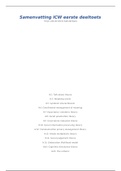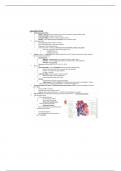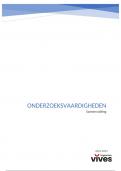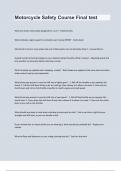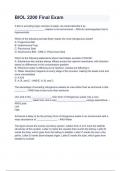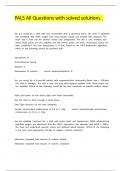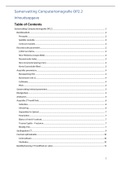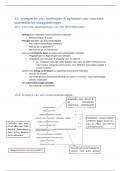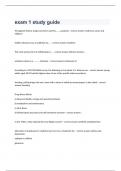Samenvatting ICW eerste deeltoets
Vrije Universiteit Amsterdam
H2: Talk about theory
H3: Weighing words
H5: Symbolic interactionism
H6: Coordinated management of meaning
H7: Expectancy violations theory
H8: Social penetration theory
H9: Uncertainty reduction theory
H10: Social information processing theory
H12: Communication privacy management theory
H13: Media multiplexity theory
H14: Social judgement theory
H15: Elaboration likelihood model
H16: Cognitive dissonance theory
H22: The rethoric
, H23: Dramatism
Hoofdstuk 2
2 verschillende soorten mensen die kijken naar communicatie
De gedragswetenschapper, Glenn Sparks: empirisch onderzoek, voert experimenten uit,
verklaart via de wetenschappelijke weg terugkerend gedrag van mensen. Menselijk gedrag als
gevolg van krachten buiten het bewustzijn van het indivudu.
De retorica, Marty Medhurst: retorische theorie en kritiek, interpreteert teksten om de
theorieën te begrijpen, gebruikt symboliek om mensen te identificeren of van een bepaald
standpunt te overtuigen.
Schwartz: resonance principle of communication theory:
Mensen bedenken een theorie bij wat ze gehoord hebben, niet andersom. De resonance leidt tot
overtuiging/ een overtuigend bericht. Dus niet wat er werkelijk gezegd wordt leidt tot de overtuiging,
maar de gevoelens/ herinneringen die worden opgewekt door het bericht = OBJECTIVISTISCH
Verschillende benaderingen
De objectieve benadering (gedragswetenschapper): er is maar 1 manier om de waarheid te
bekijken, zonder eigen gevoel naar iets kijken, dus enkel toegankelijk via onbevooroordeelde
zintuigelijke waarneming. Met het doel om oorzaak-gevolg relaties aan te duiden.
De interpretatieve benadering/ subjectief (retorica): meerdere betekenissen of waarheden
kunnen mogelijk zijn. Toekennen van betekenis en waarde aan communicatieve teksten.
Gelooft in bewuste keuzes van het individu.
Epistemologie: de studie van de oorsprong, natuur, methoden en grenzen van kennis.
Determinisme: Alles wat we doen is voorbestemd, gedrag wordt veroorzaakt door
erfelijkheid en omgeving, spreken passief (ik moest…) = OBJECTIEF
Dit staat tegenover de free-will purists: vrije wil, de besluiten en bewuste keuzes van het
individu = INTERPRETATIEF
Objectivistisch Interpretatief
Wetenschappelijk, objectief Retorisch, humanistisch , intersubjectief
gedrag actie
experimenten Interpreteren van teksten
positivisme Interpretatieve wetenschap
Waarheid Meerdere werkelijkheden
determinisme Vrije wil
Universele wetten Interpretatieve richtlijnen
Complexiteit uiteen rafelen en daardoor Complexiteit bestuderen als zijnde
Leren kennen complex
Behaviorisme constructivisme
Testend (werkt de theorie algemeen) Explorerend
Empirisch bewijs Gaat om begrijpen, niet bewijzen
Vrije Universiteit Amsterdam
H2: Talk about theory
H3: Weighing words
H5: Symbolic interactionism
H6: Coordinated management of meaning
H7: Expectancy violations theory
H8: Social penetration theory
H9: Uncertainty reduction theory
H10: Social information processing theory
H12: Communication privacy management theory
H13: Media multiplexity theory
H14: Social judgement theory
H15: Elaboration likelihood model
H16: Cognitive dissonance theory
H22: The rethoric
, H23: Dramatism
Hoofdstuk 2
2 verschillende soorten mensen die kijken naar communicatie
De gedragswetenschapper, Glenn Sparks: empirisch onderzoek, voert experimenten uit,
verklaart via de wetenschappelijke weg terugkerend gedrag van mensen. Menselijk gedrag als
gevolg van krachten buiten het bewustzijn van het indivudu.
De retorica, Marty Medhurst: retorische theorie en kritiek, interpreteert teksten om de
theorieën te begrijpen, gebruikt symboliek om mensen te identificeren of van een bepaald
standpunt te overtuigen.
Schwartz: resonance principle of communication theory:
Mensen bedenken een theorie bij wat ze gehoord hebben, niet andersom. De resonance leidt tot
overtuiging/ een overtuigend bericht. Dus niet wat er werkelijk gezegd wordt leidt tot de overtuiging,
maar de gevoelens/ herinneringen die worden opgewekt door het bericht = OBJECTIVISTISCH
Verschillende benaderingen
De objectieve benadering (gedragswetenschapper): er is maar 1 manier om de waarheid te
bekijken, zonder eigen gevoel naar iets kijken, dus enkel toegankelijk via onbevooroordeelde
zintuigelijke waarneming. Met het doel om oorzaak-gevolg relaties aan te duiden.
De interpretatieve benadering/ subjectief (retorica): meerdere betekenissen of waarheden
kunnen mogelijk zijn. Toekennen van betekenis en waarde aan communicatieve teksten.
Gelooft in bewuste keuzes van het individu.
Epistemologie: de studie van de oorsprong, natuur, methoden en grenzen van kennis.
Determinisme: Alles wat we doen is voorbestemd, gedrag wordt veroorzaakt door
erfelijkheid en omgeving, spreken passief (ik moest…) = OBJECTIEF
Dit staat tegenover de free-will purists: vrije wil, de besluiten en bewuste keuzes van het
individu = INTERPRETATIEF
Objectivistisch Interpretatief
Wetenschappelijk, objectief Retorisch, humanistisch , intersubjectief
gedrag actie
experimenten Interpreteren van teksten
positivisme Interpretatieve wetenschap
Waarheid Meerdere werkelijkheden
determinisme Vrije wil
Universele wetten Interpretatieve richtlijnen
Complexiteit uiteen rafelen en daardoor Complexiteit bestuderen als zijnde
Leren kennen complex
Behaviorisme constructivisme
Testend (werkt de theorie algemeen) Explorerend
Empirisch bewijs Gaat om begrijpen, niet bewijzen


